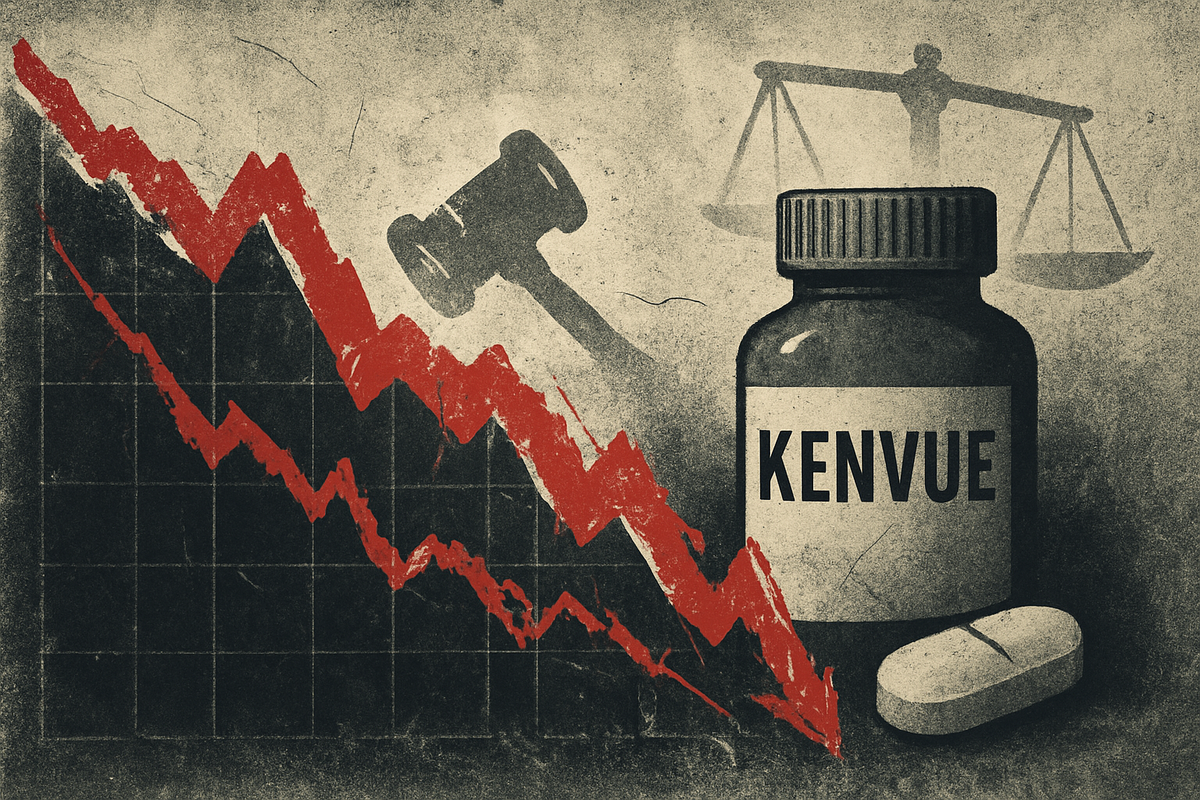Financial News
Kenvue (KVUE) Plunges Amidst Dual Headwinds: Tylenol Fears and Escalating Talc Litigation

Kenvue (NYSE: KVUE), the consumer health giant spun off from Johnson & Johnson, has found itself at the bottom of today's market performance, with its stock price experiencing a significant decline. As of October 16, 2025, the company's shares are trending down by 10.3% and have marked a year-long decline of 27.27%, hitting a 52-week low of $15.46 USD. This sharp downturn is largely attributed to a perfect storm of renewed Tylenol-related safety concerns and the intensifying specter of talc litigation, both threatening the company's financial stability and brand reputation.
The confluence of these high-stakes issues has prompted analysts to lower price targets, with some revising expectations to as low as $17-$18. Moody's Ratings has shifted Kenvue's outlook to negative, citing operational challenges and a reduced full-year guidance. The company itself has lowered its 2025 outlook, now forecasting low-single-digit declines in organic sales, a stark reversal from prior growth projections. This difficult market environment underscores the immense pressure Kenvue faces as it navigates complex legal and regulatory landscapes.
A Deep Dive into Kenvue's Legal and Regulatory Gauntlet
The immediate catalyst for Kenvue's precipitous fall stems from two major fronts: heightened scrutiny over Tylenol and a resurgence of talc-related legal battles. In September 2025, former President Donald Trump, alongside Health Secretary Robert F. Kennedy Jr., publicly voiced concerns about a potential link between Tylenol (acetaminophen) use during pregnancy and autism. These high-profile remarks quickly captured media attention and triggered a swift response from regulatory bodies.
Following these public statements, the FDA announced plans to review and potentially revise the safety labeling for acetaminophen, with officials expected to advise against its use in early pregnancy unless a fever is present. Tylenol constitutes approximately 10% of Kenvue's global sales and 12-15% of its operating profit, making any regulatory changes a significant threat. Compounding these concerns, over 500 previously dismissed lawsuits alleging Tylenol caused autism and ADHD in children are now being appealed, with arguments scheduled for October 6, 2025. Despite Kenvue's firm stance that "sound and independent science" does not support such a causal link – a position echoed by major medical bodies like the CDC, the American Academy of Paediatrics (AAP), and the European Medicines Agency (EMA) – the sheer volume and public nature of these claims have rattled investor confidence, causing shares to drop by as much as 16% in October 2025.
Simultaneously, Kenvue is grappling with a significant UK lawsuit concerning talc-based products. On October 15, 2025, the company was served with a complaint involving thousands of claimants who allege that asbestos contamination in talc-based baby powder caused ovarian cancer or mesothelioma. These plaintiffs claim that Johnson & Johnson (NYSE: JNJ), and by extension Kenvue, concealed health risks for decades. While Kenvue vigorously denies these allegations, asserting its cosmetic grade talc was asbestos-free and safe, the legal entanglement is substantial. An August 2025 ruling by a New Jersey federal judge further complicated matters by rejecting Johnson & Johnson's attempt to prevent Kenvue Inc. and Janssen Pharmaceuticals Inc. from being added as defendants in multidistrict federal litigation related to talcum powder products, signaling Kenvue's continued exposure to these costly legal battles.
Market Ripple Effects: Who Wins and Who Loses?
Kenvue (NYSE: KVUE) is undoubtedly in the unenviable position of a significant loser in this scenario. The direct financial implications include potential declines in Tylenol sales due to regulatory changes and increased consumer apprehension, coupled with substantial legal costs and potential liabilities from both the Tylenol and talc lawsuits. The negative publicity surrounding these issues can erode brand trust, making it harder to maintain market share for its other prominent consumer health brands. Furthermore, concerns about the sustainability of its dividend, with a reported payout ratio as high as 112.16%, add to the financial strain and investor skepticism.
While Kenvue bears the brunt, the broader consumer health market could experience indirect effects. Competitors in the over-the-counter (OTC) pain relief and personal care sectors might see a temporary uplift if consumers switch away from Kenvue's brands, though this is not guaranteed. However, the increased regulatory scrutiny on acetaminophen could cast a shadow over the entire pain relief category, potentially leading to broader labeling changes or a general decline in consumer confidence across the board. Companies offering alternative pain relief solutions or those with strong, unblemished safety records in personal care might find themselves in a relatively stronger position, but the overall climate for consumer health product manufacturers could become more challenging due to heightened public and regulatory vigilance.
Broader Implications and Historical Context
This unfolding situation for Kenvue (NYSE: KVUE) is indicative of broader industry trends where consumer goods companies, particularly those with long histories, face increasing scrutiny over product safety and legacy liabilities. The Tylenol concerns highlight the growing influence of public figures and social media in shaping consumer perception and driving regulatory action, even in the absence of definitive scientific consensus. It underscores the challenges of managing public health narratives, especially when they intersect with political discourse. The potential FDA review of acetaminophen labeling could set a precedent for other widely used OTC medications, leading to a more conservative approach to product labeling and marketing across the pharmaceutical and consumer health industries.
The talc litigation, on the other hand, is a stark reminder of the long tail of product liability. For Kenvue, as a spin-off, inheriting these liabilities from Johnson & Johnson (NYSE: JNJ) underscores the complexities of corporate restructuring, especially when dealing with products with decades of market presence. Historically, major product liability cases, such as those involving asbestos or tobacco, have resulted in multi-billion dollar payouts and fundamental shifts in how industries operate. While Kenvue maintains its innocence, the sheer scale of the UK lawsuit and the ongoing legal battles in the U.S. suggest a protracted and costly fight, drawing parallels to how other companies have navigated similar mass tort litigations. The outcome could influence how future spin-offs are structured, particularly regarding the allocation of legacy legal risks.
What Comes Next for Kenvue?
In the short term, Kenvue (NYSE: KVUE) will be intensely focused on mitigating the immediate impact of these legal and regulatory challenges. This will involve vigorous defense in the ongoing Tylenol and talc lawsuits, likely accompanied by public relations efforts to reassure consumers and investors about the safety and efficacy of its products. The company will need to closely monitor the FDA's acetaminophen review and prepare for any necessary labeling changes, which could involve significant marketing adjustments and potential revenue hits. Investors should anticipate continued volatility in Kenvue's stock as legal proceedings unfold and regulatory decisions are announced.
Longer term, Kenvue may need to consider strategic pivots. This could include diversifying its product portfolio to reduce reliance on legacy brands like Tylenol, investing more heavily in innovation for new consumer health solutions, or exploring divestitures of certain product lines that carry high litigation risk. The company might also need to reassess its dividend policy to ensure financial flexibility amidst potential legal settlements. Market opportunities may emerge for competitors who can demonstrate superior product safety or offer effective alternatives, while Kenvue faces the challenge of rebuilding trust and navigating a potentially more stringent regulatory environment. Scenarios range from a successful defense and market recovery to significant financial penalties and a lasting impact on its brand equity, making the coming months critical for the company's trajectory.
Comprehensive Wrap-Up
Kenvue's (NYSE: KVUE) current struggle as a bottom stock performer is a potent illustration of how legal challenges and regulatory shifts can rapidly impact even established consumer health giants. The convergence of renewed Tylenol safety concerns and escalating talc litigation has created a formidable hurdle, challenging the company's financial forecasts, brand reputation, and investor confidence. Key takeaways include the significant financial exposure from both fronts, the critical role of public and political discourse in shaping regulatory actions, and the enduring complexity of managing legacy product liabilities post-spin-off.
Moving forward, the market will closely watch the outcomes of the appealed Tylenol lawsuits, the FDA's acetaminophen labeling review, and the progression of the UK talc lawsuit. Kenvue's ability to effectively manage these multifaceted challenges, maintain consumer trust, and adapt its business strategy will determine its long-term viability and market position. Investors should pay close attention to legal rulings, regulatory updates, and any strategic announcements from Kenvue in the coming months, as these will be crucial indicators of its path forward and potential for recovery.
This content is intended for informational purposes only and is not financial advice
More News
View More





Quotes delayed at least 20 minutes.
By accessing this page, you agree to the Privacy Policy and Terms Of Service.



